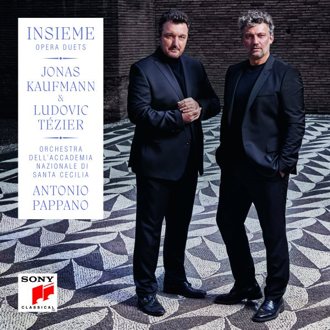|
|
|
|
|
|
|
|
|
Gramophone |
| Mark Pullinger |
|
Insieme - Opera Duets (Jonas Kaufmann, Ludovic Tézier)
|
|
 There
have been some great tenor-baritone double acts down the decades. How many
people, for instance, were introduced to the delights of opera via Jussi
Björling and Robert Merrill’s famed recording of the Pearl Fishers duet?
It’s one of the great friendship duets, but tenors and baritones are more
often set as operatic rivals. There
have been some great tenor-baritone double acts down the decades. How many
people, for instance, were introduced to the delights of opera via Jussi
Björling and Robert Merrill’s famed recording of the Pearl Fishers duet?
It’s one of the great friendship duets, but tenors and baritones are more
often set as operatic rivals.
In the early 1970s, Plácido Domingo and
Sherrill Milnes were a familiar pairing on many complete operas for RCA and
EMI. They recorded a fabulous disc of duets together (7/71) as well as an
album of arias where each conducted the New Philharmonia for the other (3/74
– Domingo’s first conducting gig?). As well as being good foils for each
other – Milnes’s noble baritone blending well with Domingo’s baritonal tenor
– the two were great friends and obviously spurred each other to be their
very best.
Also spurring each other to be their very best are today’s
leading tenor-baritone bromance, Jonas Kaufmann and Ludovic Tézier. The
German tenor is operatic royalty, in demand around the globe and able to
pick and choose his roles in whichever house he fancies. Critics will argue
which repertoire suits him best, but he’s proved himself in German, Italian
and French operas and even took on the role of Peter Grimes this year. His
good pal Tézier recently took his first foray into Wagnerian territory,
singing Amfortas – opposite Kaufmann’s Parsifal, naturally – but is most
associated with Italian roles. He is the reigning Verdi baritone de nos
jours and his debut disc of arias deservedly won a Gramophone Award in 2021.
Despite Bizet’s hit number, Verdi composed the very best tenor-baritone
duets and he dominates this new programme: the friendship duet from Don
Carlos; the closing scene from Act 2 of Otello; two father-son duets from
Les vępres siciliennes; and the three duets that chart Don Carlo’s hounding
of Don Alvaro from army camp to monastery in La forza del destino.
I
have seen them in Don Carlos in Paris and in Forza in London, and there’s a
real spark when Kaufmann and Tézier sing together. Their voices fit like a
glove here in the Don Carlos duet (sung in the original French version, so
quite extended at the beginning). Like Milnes and Domingo, they’re quite
close in timbre, so the bond of friendship seems especially strong. They
blend beautifully too in ‘Solenne in quest’ora’ from Forza, in a scene where
both characters are in disguise – hey, this is opera – Alvaro believing he
is dying and entrusting a sealed packet to his new friend. In the two later
duets from the opera, Tézier goads Kaufmann’s Alvaro doggedly. Perhaps the
sparks don’t fly as viscerally as Mario Del Monaco going at it hammer and
tongs with Ettore Bastianini in their Decca recording (12/55), but you can
tell they’re both well inside their characters due to their stage
experience.
Kaufmann has now settled into the role of Otello, here
flying off the handle with real anger. Iago is a newer role to Tézier
(making his debut in 2021) but his account of Cassio’s dream is darkly
insinuating and they let rip in the closing duet where they swear vengeance,
‘Sě, pel ciel marmoreo giuro!’ Montfort and Henri in Vępres are not yet (to
my knowledge) in Tézier or Kaufmann’s rep, but given their performances here
I’d dearly love to see them in a revival of Stefan Herheim’s Royal Opera
staging. There’s a nobility to their singing in the original French version,
whereas Milnes and Domingo (in Italian) are much more brusque. With one of
the world’s greatest Verdians, Antonio Pappano, pacing the music with his
unerring sense of drama, the Orchestra dell’Accademia Nazionale di Santa
Cecilia coat these Verdi duets in luxury wrapping. If only Sony had
condescended to provide texts and translations in the booklet.
Away
from Verdi, the programme opens with Rodolfo and Marcello mooning over their
failed relationships in La bohčme (perhaps not the most convincingly
youthful bohemians). And there’s that terrific scene for Enzo Grimaldo and
the Inquisition spy, Barnaba, from Ponchielli’s La Gioconda, their two
stylish voices opening up like a pair of Porsches. This was another Del
Monaco/Bastianini favourite (2/58), guaranteed to get the blood pumping. The
only thing that’s really missing is that Pearl Fishers duet. Fear not, mes
amis, for Tézier guested on Kaufmann’s 2017 French disc ‘L’Opéra’ (10/17),
where I reported their voices blended ‘like coffee and cream’. The perfect
encore after an incredibly enjoyable album.
|
|
|
|
|
|
|
|
|
|
|
|
|